The Secret Website Behind a $140 Million ‘Scam PAC’ Network
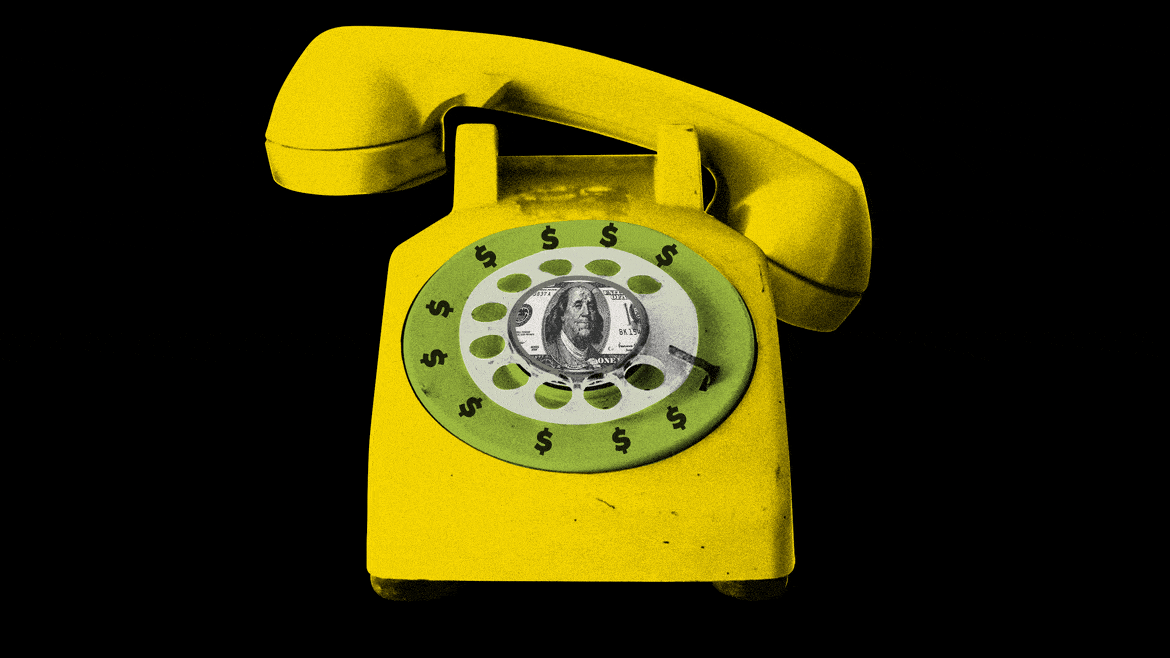
Pay Dirt is a weekly foray into the pigpen of political funding. Subscribe here to get it in your inbox every Thursday.
Americans for The Cure of Breast Cancer. Autism Hear Us Now. The National Police and Sheriff’s Coalition. American Wounded Veterans. The Firefighters Support Association.
While these groups all sound like they support different and worthy causes, they have one conspicuous common denominator—they’re all actually Political Action Committees.
They’re also among the 43 PACs listed as clients on a mystery call center’s secret website uncovered by The Daily Beast. And about half of them were named in a recent class-action lawsuit.
That secret website will be the basis for a three-part series on a sprawling network of so-called “scam PACs”—a derisive name for a group that styles itself as a charity while being registered as a political committee, recycling the majority of its donations back into shady fundraising and telemarketing groups that are often tied to the PAC operators themselves.
This first installment will look at the secret call site itself—its clients, how much they raise and spend, how the call scripts work, and how these groups bend the edges of federal law to fit a business model that has so far eluded much enforcement. (The website is archived here.)
What makes this secret call site so unique is, in fact, its website, which offers a rare glimpse into the workings of a shadowy, largely unregulated—and extraordinarily lucrative—operation.
According to The Daily Beast’s analysis of Federal Election Commission filings, the 43 client PACs on the call center website have raised more than $140 million in the last two election cycles alone. That’s a staggering amount of money—more than former President Donald Trump has raised in total for his flagship Save America PAC.
The call center has so many PAC clients that it maintains two lists. And they feature some of the most notorious groups in the country, including Law Enforcement for a Safer America, a sort of scam PAC clearinghouse that was the subject of a CNN investigation in 2020.
Upon reviewing the website, Jordan Libowitz, communications director at Citizens for Responsibility and Ethics in Washington, said the groups fit the “scam PAC” bill.
“When we talk about scam PACs, it’s a term that generally means a political action committee that isn’t really spending on candidates or political elections, and is for the most part pushing money to telemarketing and direct mail consultants and the people running the PACs,” explained Libowitz, who has studied scam PACs for years.
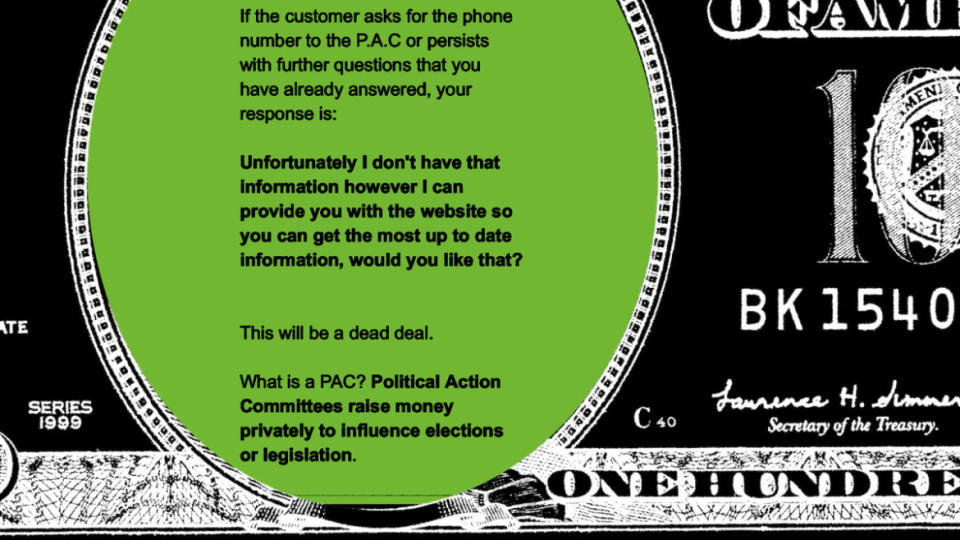
“This seems like a clear scam where the only reason the PACs exist is to drive money back into these companies,” he added.
Brendan Fischer, a campaign finance law expert and deputy executive director of watchdog group Documented, said that federally registered scam PACs are lightly regulated.
“The FEC has little authority to regulate misleading fundraising appeals, and PACs are allowed to spend their money on almost anything,” Fischer told The Daily Beast. He noted that while candidates cannot use campaign funds for self-enrichment, “PACs are not subject to those restrictions.”
The call center website provides no information about the entity or entities that control it. (Its homepage is the only page that is password-protected.) Website data, however, suggests the page was created in 2012, even though none of the client PACs are very old. Most date back just a few years, and many of them have been terminated, which operators often do before setting up a new PAC. (Google says the site was first indexed in 2019.)
One way to find out who runs the site would be to see whether the PACs have a common vendor in their FEC reports. But there are nearly four dozen groups, each with years of reports. And, like with the PACs themselves, the operators frequently shut those companies down and then open up again under new names—with many of them registered anonymously, using corporate agents.
This all makes a chain of custody difficult to establish. It’s also possible that the call center could serve as a central hub not just for the PACs, but for the telemarketing companies they’re tied to.
However, the client list offers at least one clue. It turns out about half the PACs listed on the site are also at the center of a class-action lawsuit filed in federal court for the Middle District of Pennsylvania in 2021, and which remains unresolved.
That lawsuit identifies a network of 24 PACs and four companies, tying all of them to one man: Richard Zeitlin. (Zeitlin has denied wrongdoing.)
These PACs purport to advocate for veterans, police, firefighters, and sick or disabled children, ostensibly by endorsing lawmakers who will stand up for those issues. But according to the lawsuit, the Zeitlin companies “place millions of calls on behalf of these Scam PACs seeking donations for the sole purpose of having those funds funneled back to the Zeitlin Companies by the Scam PACs’ complicit treasurers.”
The plaintiffs allege that by using autodialing and automated responses, the companies are in violation of the Telephone Consumer Protection Act.
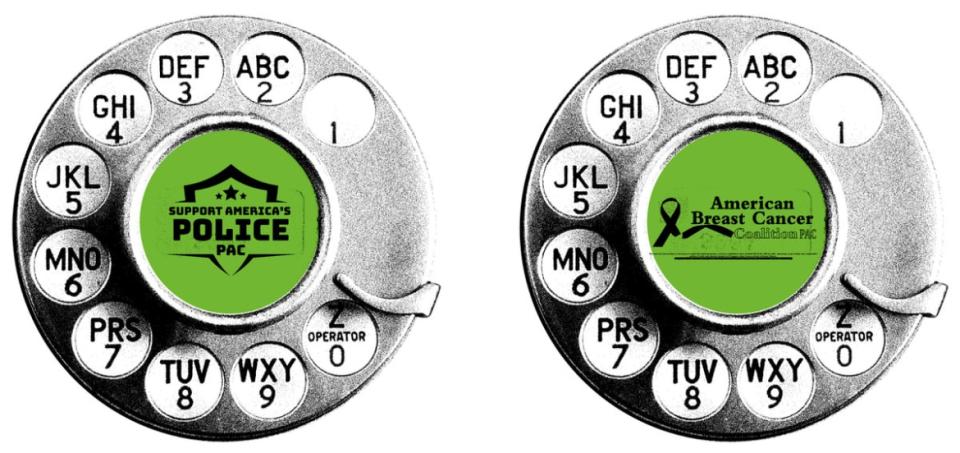
It seems clear that those Zeitlin PACs have been clients of this call center, but it’s still unclear exactly who is behind the website. Its pages are chock-full of other information, however.
The website includes scripts for payment processing and “rebuttals” to donors, as well as what appears to be a set of automated soundboard operating instructions for answering questions from difficult, impecunious, or skeptical donors. (The call center keeps a list of charity clients, too, but more on that later.)
The scripts and soundboard are unclear on one critical point, however—how the calls originate. None of the scripts are introductions. Instead, they handle persuasion and processing.
The most notable element in the payment processing scripts is that they never tell donors that their PAC donation is not tax-deductible until after the payment has gone through.
As The Daily Beast previously reported, scam PAC donors are often elderly. With that in mind, the automated soundboard replies are revealing.
For instance, in a scenario where a potential donor doesn’t know their own address, the soundboard operator asks the donor, “Do you have a piece of mail that you can get it from?”
The soundboard replies also suggest the operators might be deceiving donors about having made contribution pledges that they didn’t actually make—or at the very least don’t remember making.
For instance, if a donor is told they’ve been contacted because they made a prior pledge, but they don’t recall if or when they made that pledge, the board operator is instructed to respond, “I show here we spoke with you a few weeks back.” If the donor asks again, the operator is instructed to respond, “I don’t show the exact call date. My records indicate it was sometime last month.”
In a scenario where a donor says they don’t have money, the designated soundboard reply says that “times are tough” for the PAC, too, which is why they need to “get the much needed funds right to work.” The donor is then asked to put the donation on a credit card. (The scripts always steer donors away from checks and towards immediate debit and credit card payments.)
Then there’s the question of whether the target donor understands that they aren’t giving to a charity, but a registered political group. Here’s how the script sidesteps that issue.
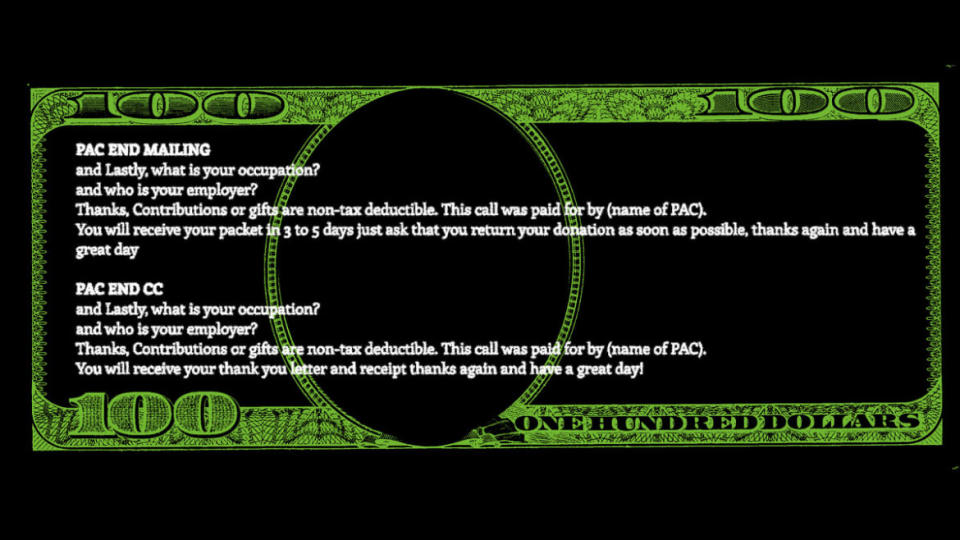
If the customer asks for the phone number for the PAC, the response is, “Unfortunately I don’t have that information.” The operator then offers to give the PAC’s website address.
(The script acknowledges that this donor might be too sophisticated, offering a side note that tells the operator, “This will be a dead deal.”)
The PAC sections also have what appear to be call scripts. They often dance around outright saying what a PAC actually is—especially when the question is about tax status.
For instance, if a target donor wants to know about the tax status for the “American Veterans Support Group PAC” (aka the “Paralyzed and Disabled Veterans Project PAC”; $837,000 raised for 2022) the script says, “Because they advocate for veterans, donations are not tax deductible but even more appreciated.” Libowitz called that phrasing “especially cynical.”
A few groups are more specific about being a PAC. For the Association for Emergency Responders and Firefighters ($4 million raised since 2020), the script says that “the donation is not tax deductible because this is a political action committee that advocates for Emergency Responders and Firefighters,” adding, however, that “all proceeds go to defray the cost of the appeal.”
But not all call center clients are PACs. Some, it turns out, are registered as charities. They’re just not as lucrative. And in order to dance around federally regulated nonprofit laws, they have to be more crafty.
For example, there’s the “Firefighter Cancer Alliance,” run out of Knoxville, Tennessee, by former scam PAC operator Alan Bohms. The FCA website no longer exists, but according to an archived version from 2022, it was actually a program of the Volunteer Firefighter Alliance. (So is another charity listed on the page, the National Volunteer Firefighter Alliance.)
According to tax records, the VFA raised about $6.6 million in 2020. The document also claimed it spent only $1.9 million on professional fundraising. And while the organization lists a number of notorious telemarketing companies as payees, it’s nowhere near the same ratio that the PACs exhibit.
However, the filing also says the group’s total fundraising costs came out to $4.1 million. It’s not immediately clear exactly where that money went. Salaries ate up another $341,000, and management expenses were about $708,000—which together equal the costs for the organization’s actual programs ($1.2 million), most of which involve mailers. (Programs also had $186,550 in officer salaries.)
Then there’s the American Breast Cancer Support Association, also based in Knoxville. That group is under the umbrella of the United Cancer Support Foundation. While the UCSF website says donations are handled by nonprofit payment processor Network For Good, the total received from NFG in 2020 was just $19,210. Meanwhile, the UCSF raised $2.6 million—suggesting the bulk of its money did not come through website donations, but other outreach.
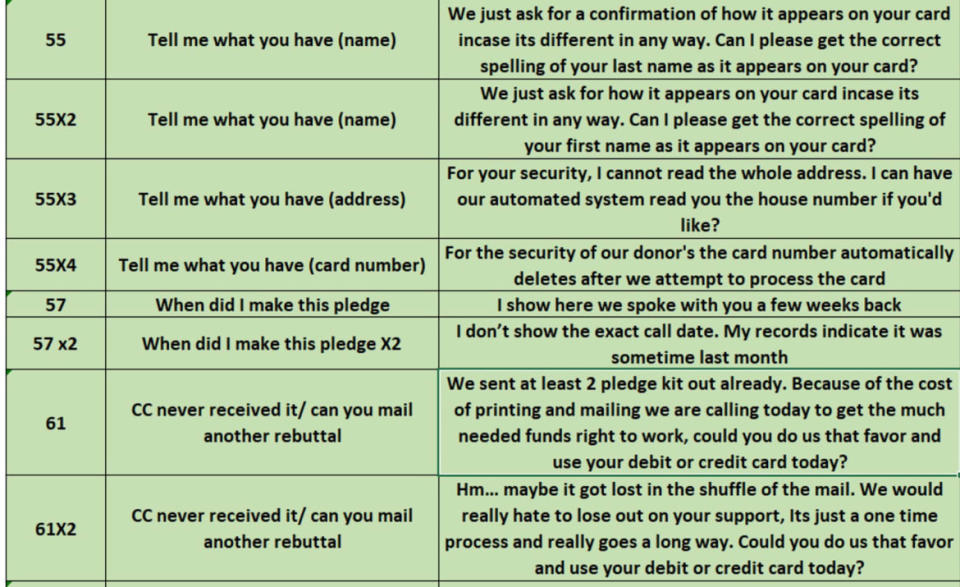
It turns out the UCSF spent $2.3 million of its 2020 donations on professional fundraising services. It didn’t have much left over to fund its “recliners for recovery” program, which its website says provides easy chairs to cancer patients. The project received zero money in 2020, according to the tax filing.
While some PACs that support different issues appear tied to each other—the American Firefighter Support PAC directs to supportcopsusa.org, as does the Disabled Veterans Assistance PAC—there’s only one person who double-dips in both the PAC world and the charity world.
That would be Michael Slutsky, whose Autism Spectrum Disorder Foundation nonprofit spent $2.2 million of its $2.9 million in donations on fundraising in 2020, according to its tax filing that year.
That same year, Slutsky’s American Alliance for Disabled Children PAC (aka the American Coalition for Autistic Children; aka the Children’s Cancer Coalition, per the call center site) raised $1.35 million and spent almost that exact amount.
Slutsky’s PAC, however, is not listed in the Zeitlin lawsuit.
Subscribe to the Pay Dirt newsletter here to follow the movement of the dirty dollars influencing our public policy.
Get the Daily Beast's biggest scoops and scandals delivered right to your inbox. Sign up now.
Stay informed and gain unlimited access to the Daily Beast's unmatched reporting. Subscribe now.

